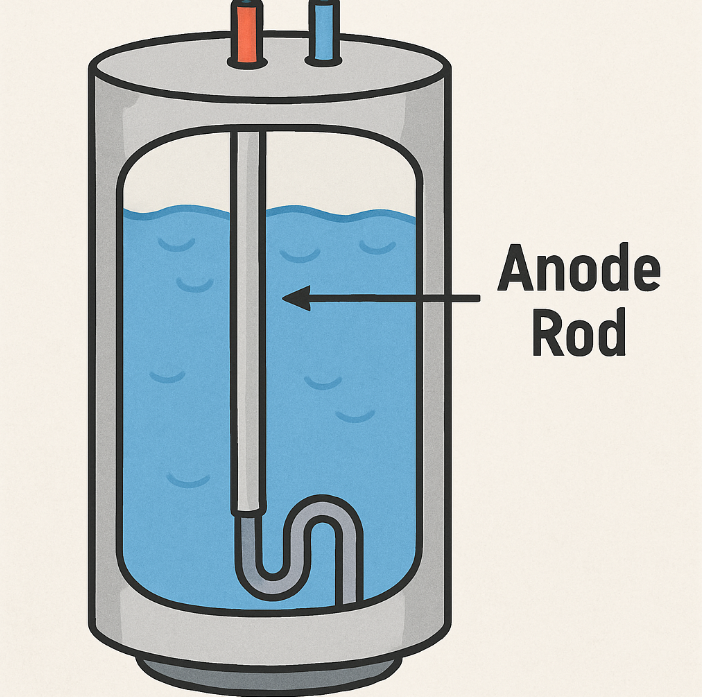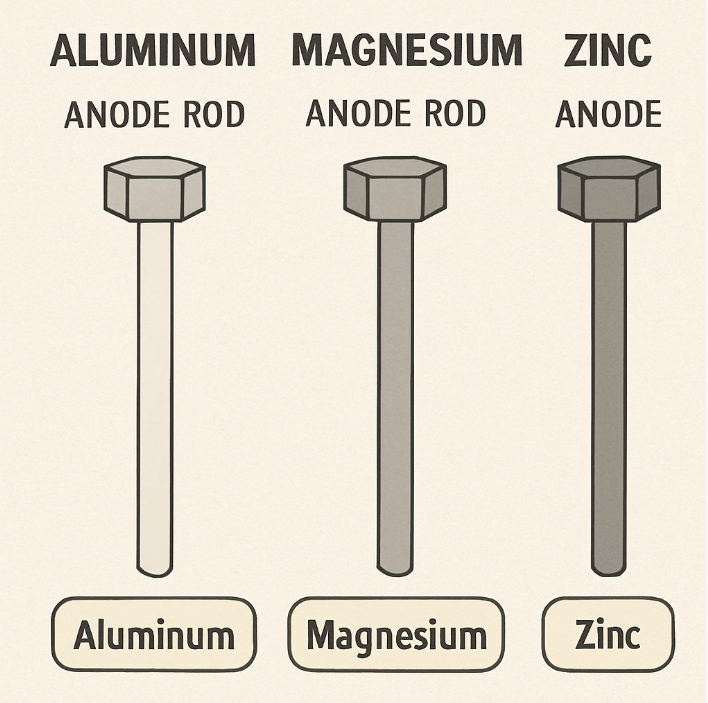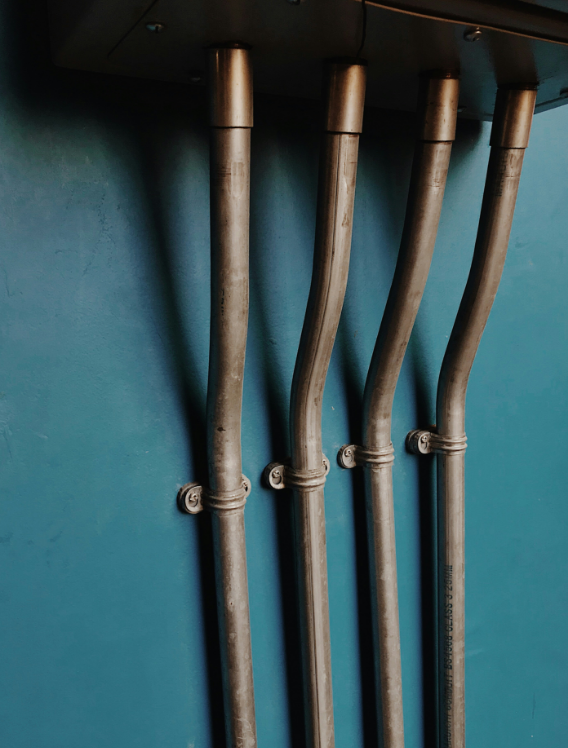Picking the right anode rod for your water heater is super important. It can really make your appliance last a lot longer.
Anode rods are key parts that stop corrosion inside water heaters. They act like a shield, corroding themselves instead of your tank lining.
You\'ll find different kinds of anode rods out there, like aluminum, magnesium, and zinc. Each one has its own good points and not-so-good points.
The best anode rod for you depends on your water quality and what you prefer. Things like hard water or well water can definitely sway your choice.
This guide will help you get a handle on the differences and make a smart decision. Keep your water heater safe with the best anode rod for your needs.
An anode rod is a super important part of any water heater. It keeps the tank from rusting by sacrificing itself. Mostly made of metals like aluminum or magnesium, it draws in corrosive stuff.
You really can\'t overstate how important an anode rod is. Without it, your water heater tank would rust out and fail pretty fast. That would mean expensive repairs or having to buy a new one.
Here's why anode rods are so vital:
Stops rust and corrosion
Makes your tank last longer
Saves you money on replacements
To keep things running smoothly, check your anode rod regularly. Swapping it out when needed makes sure your water heater stays effective for years.

When it comes to anode rods, the material you pick makes a big difference. Aluminum, magnesium, and zinc are the most common types you\'ll find. Each one has its own unique upsides and downsides.
Magnesium anode rods are great at fighting corrosion. They\'re super effective but tend to wear out faster in hard water areas. So, you\'ll need to check and replace them more often.
Aluminum anode rods are a better fit for hard water conditions. They last longer than their magnesium buddies in those settings. However, some folks mention a metallic aftertaste in their water.
Zinc rods aren\'t as popular, but they have a special job. They\'re usually mixed with aluminum to cut down on sulfur smells. This makes them perfect for places with stinky water issues.
Here's a quick rundown:
Magnesium Rods: Very effective, but corrode faster
Aluminum Rods: Best for hard water, last longer
Zinc Rods: Helps reduce sulfur smells
Choosing the right material can really change how well your water heater works and the quality of your water.

Deciding between aluminum and magnesium anode rods really comes down to your specific needs. Each one has its strengths that make them perfect for different water conditions.
Magnesium rods are awesome for everyday household use. They give top-notch protection against rust, helping your water heater last longer. But, if you live in a hard water area, they wear out faster, meaning more replacements.
Aluminum rods really shine in hard water environments. They hold up well in these conditions, making them a popular pick for homes dealing with mineral-rich water. Still, some people notice a slight metallic taste, which could be a concern.
When you\'re choosing, think about these things:
Water Condition: Hard water leans towards aluminum.
Durability Needs: Magnesium offers high protection.
Taste Sensitivity: Aluminum might change your water's taste.
Ultimately, the choice depends on your local water quality and what matters most to you. Check out your situation to make the best call for your heater's performance.

If you\'re in an area with hard water, aluminum anode rods usually work best. They\'re made to handle tough, mineral-heavy water and give long-lasting protection.
Magnesium rods corrode quicker in hard water, meaning you\'ll replace them more often. This can lead to higher maintenance costs over time. But aluminum rods really excel here, offering a more durable fix.
For those dealing with hard water, aluminum anode rods offer these perks:
Longevity: Fewer replacements needed.
Cost-Effectiveness: Saves you money on upkeep.
Corrosion Resistance: Works great in mineral-rich water.
Choosing aluminum helps make sure your water heater stays protected from the harsh effects of hard water. This choice means less worrying about your tank failing too soon, keeping your investment safe.
When you\'re dealing with well water, picking the right anode rod is super important. Well water often has more minerals than city water, which can mess with how your anode rod performs.
Combination anode rods, which mix aluminum and magnesium, offer a balanced approach. They give strong protection while adapting to the different mineral levels you find in well water.
Keep these points in mind when choosing an anode rod for well water:
Dual Composition: An aluminum-magnesium mix for versatility.
Odor Control: Helps cut down on sulfur smells.
Enhanced Protection: Shields against high mineral content.
For homeowners using well water, these combo rods ensure your water heater lasts longer and keeps your water quality good. They help you avoid nasty odors and protect against expensive tank damage, making them a smart buy.
Choosing the right anode rod for your water heater might feel a bit overwhelming. But, once you get a handle on your water quality, the process gets a lot simpler. Hardness, mineral content, and where your water comes from are all key things to think about.
Take a look at the benefits of different materials. Magnesium rods protect well but break down faster in hard water. Aluminum rods, on the other hand, last longer in tough conditions, making them ideal for hard water.
To help you decide, keep these points in mind:
Water Quality: This tells you what rod material to use.
Lifespan: Think about how long you want it to last.
Maintenance Needs: How committed are you to regular checks?

By matching the rod type to what you specifically need, you get better protection. This approach saves you both time and money in the long run.
Swapping out an anode rod is a pretty straightforward DIY job. With just a few basic tools, you can keep your water heater safe from corrosion. Just follow these simple steps to replace your anode rod:
Turn Off Power and Water: First, cut the electricity and shut off the water supply.
Drain the Heater: Hook up a hose to the drain valve and let some water out.
Find and Remove the Rod: Use a wrench to unscrew the old rod.
Install the New Rod: Screw in the new rod tightly.
Restore Power and Water: Turn the water supply and electricity back on.

Regular replacements mean your heater will last longer and work better. Don\'t skip this crucial maintenance task!
Keeping up with your anode rod maintenance is key to making your water heater last. Regular checks can save you from expensive repairs down the line. Here are some essential tips:
Check Annually: Give your anode rod a look every year.
Replace Regularly: Plan to replace it every 3-5 years, depending on your water quality.
Look for Corrosion: If more than half of the rod is corroded, it’s time for a new one.
Being proactive helps you avoid unexpected heater breakdowns. Staying on top of things ensures your anode rod works efficiently and keeps your system protected.
Choosing the best anode rod for your water heater is super important. It can really make your appliance last a long time. Regular maintenance and smart choices ensure your water heater runs smoothly.
By picking the right anode rod, you stop corrosion and avoid costly repairs. Anode rods might be small, but they play a huge role in your water heater’s health. Protect your investment today by taking care of this essential part!